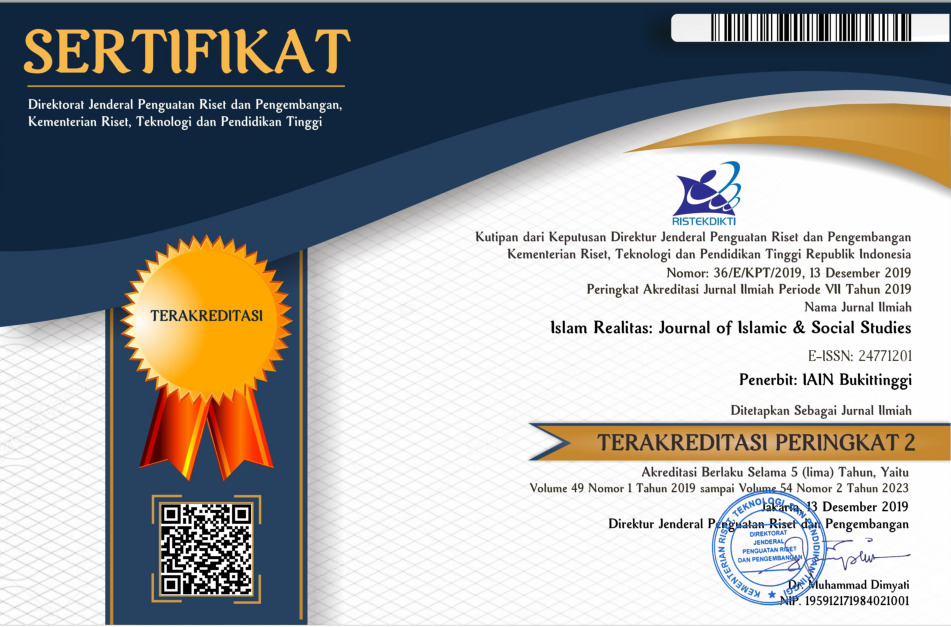CONTRIBUTIONS OF KAMPUNG INGGRIS PARE AND ITS IMPLICATIONS FOR UNSKILLED MUSLIM MIGRANT WORKERS
Downloads
Additional Files
The advantages of becoming Indonesian Muslim migrant workers abroad (known as TKI) are likely under expectation. Most of the workers engage in the informal sector without proper skills. The income generated from them is marked as the second-largest income after the energy sector. Ironically, most of them are regarded as becoming unavailable to access all form of worker rights appropriately. This research is qualitative research that aimed to describe and analyse the problem which relates to the circumstance of the people of Kediri who have the hight interest of working abroad at informal sector mainly, but without proper skills. The establishment of Kampung Inggris (Village for Learning English) located in Pare, the district of Kediri in East Java offers the people of Kediri many business opportunities since many visitors come to spend their money and time to learn English in Kampung Inggris. It is a highly potential circumstance that can be managed to transform a new economic sector behind the existing sectors such as the existing agricultural sector. Â This research is qualitative in the form of field research which is narrated analytically descriptively. This study attempts to capture directly how inequality occurs in Kediri people who have a strong interest in becoming an informal worker who does not have adequate skills abroad. The development of English villages in Kediri Regency is a promising business space for indigenous people and other communities around Kediri. The presence of academic tourists to study English has become a prospective economic gap. Ranging from regional tours to culinary, from lodging to bicycle sports, from laundry to stationery. A local potential that has gone international to change the agrarian economy towards a skill-based economy with various subsectors that can be developed with various variants in it.
Ngaung indahnya jadi Tenaga Kerja Indonesia (TKI) memang tidak semanis yang dirasakan. Terutama Tenaga Kerja Wanita (TKW) yang bergerak di sector informal tanpa skill yang memadai. Mereka dipuji negara karena dianggap penyumbang devisa yang signifikan. Uang yang mengalir ke Indonesia berada pada peringkat ke dua terbesar setelah devisa dari sector migas. Di negara sana, mereka dijajah lahir dan batin, tapi ketika meninggal, mereka “dibiarkanâ€. Sebuah resiko yang tidak berimbang. Penelitian ini merupakan penelitian kualitatif dalam bentuk penelitian lapangan yang dinarasikan secara deskriptif analitis. Penelitian ini mencoba memotret langsung bagaimana terjadinya ketimpangan dalam masyarakat Kediri yang mempunyai animo yang kuat untuk menjadi TKI/TKW informal yang tidak memiliki skill memadai ke luar negeri. Perkembangan kampung Inggeris di Kabupaten Kediri menjadi ruang usaha yang menjanjikan bagi pribumi dan masyarakat lain di sekitar Kediri. Kehadiran wisatawan akademik untuk belajar bahasa Inggeris menjadi celah ekonomi yang prospektif. Mulai dari wisata daerah hingga kuliner, dari penginapan hingga olah raga sepeda, dari laundry hingga alat-alat tulis. Sebuah potensi lokal yang telah go internasional untuk mengubah ekonomi agraris menuju ekonomi berbasis skill dengan berbagai subsector yang dapat dikembangkan dengan berbagai varian di dalamnya.
Books
Ambaretnani, Prihatini and Selly Riawanti, Upaya Meningkatkan dan Melindungi Kesehatan Reproduksi TKIW (Yogyakarta: Galang Press, 1999)
Anitasari, Kusnul Dwi, Dari Desa Menjadi Kampung Inggris (Kajian Sejarah Perekonomian Desa Tulungrejo Pare Kediri 1977-2011 (Malang, UM Press, 2013)
Budi, Valiant, Kedai 1001 Mimpi, Kisah Nyata Seorang Penulis yang Menjadi TKI (Jakarta: Gagasmedia, 2011)
Busyairi, Mufid A,. Republik Salah Urus Menguak Nasib Buram Petani Indonesia (Jakarta: PT Wahana Semesta Intermedia, 2008)
Fakih, Mansour, Bebas dari Neoliberalisme (Yogyakarta: Insist, 2010)
Jubilee, 101 Tip & Trik Mencari Kerja Online (Jakarta: PT Elex Media Komputindo, 2008)
Nouval, Zacky F., dkk, Petaka Politik Pangan Indonesia, Konfigurasi Kebijakan Pangan yang Tak Memihak Rakyat (Malang, Intrans Publishing, 2010)
Setiadi, Elly M., Pengantar Sosiologi, Pemahaman Fakta dan Gejala Permasalahan Sosial: Teori, Aplikasi, dan Pemecahannya (Jakarta: Kencana Predana Media Group, 2011)
Sudjana, Eggi, Melepas Ranjau TKI, Strategi Pemberdayaan Buruh Migran (Jakarta: RM Books, 2009)
Journals
Azeharie, Suzy, ‘Pola Komunikasi Antara Pedagang dan Pembeli di Desa Pare, Kampung Inggris Kediri’, Jurnal Komunikasi, 7 (2016), 207–23 <https://doi.org/10.24912/JK.V7I2.19>
Haryanto, Endang, ‘Teacher s’ Corrective Feedback on Students ’ Pronunciation at the Daffodils English Course Kampung Inggris Pare Indonesia’, Linguists: Journal of Linguistics and Language Teaching, 2 (2015), 23–34
Huda, Anam Miftakhul, ‘The Identity of Javanese Women (The Study of Phenomenology Toward Indonesian Migrant Women Workers)’, JARES (Journal of Academic Research and Sciences), 1 (2016), 61–72 <https://doi.org/10.35457/jares.v1i1.506>
Irdaf, Irdaf, ‘Mobilitas Pencarian Kerja Dan Remitan: Kasus Desa Pojok Kabupaten Kediri, Jawa Timur’, Berdikari: Jurnal Pengabdian Masyarakat Indonesia, 1 (2018), 105–12 <http://jurnaljpmi.com/index.php/jpmi/article/view/38>
Prastiwi, Finna Dwi, ‘The Study of Teacher Talks Used By English Course Teacher of Pare-Kediri in Speaking Class’, RETAIN, 3 (2006), 1–5
Primawati, Anggraeni, ‘Remitan Sebagai Dampak Migrasi Pekerja ke Malaysia’, Sosio Konsepsia, 16 (2017), 209–22
Rahayuningsih, Eni Sri, ‘Analisis Pengelolaan Tenaga Kerja Indonesia (TKI) Di Jawa Timur’, Media Trend, 1 (2016), 35–48
Ruhamak, M Dian, and Budi Rahayu, ‘Pengaruh Word of Mouth Terhadap Purchase Intention Melalui Brand Image pada Lembaga Kursus Bahasa Inggris Dynamic English Course Pare’, Ekonika : Jurnal Ekonomi Universitas Kadiri, 1 (2017), 32–33 <https://doi.org/10.30737/ekonika.v1i2.14>
Sayono, Joko, Indah Wahyu Puji Utami, and Lutfiah Ayundasari, ‘Migrant Workers and Socio-Economic Changes’, Masyarakat, Kebudayaan dan Politik, 31 (2018), 176–89
Sili Antari, SE, ‘Pengaruh Pendapatan, Pendidikan, Dan Remitan Terhadap Pengeluaran Konsumsi Pekerja Migran Nonpermanen Di Kabupaten Badung (Studi Kasus Pada Dua Kecamatan Di Kabupaten Badung)’, Piramida, 4 (2008), 20–35
SUGEHA, Az, ‘Students’Motivation on Learning English At Toefl Program of Elfast English Course in Pare’, Jurnal Ilmiah Mahasiswa FIB, 2 (2015), 45–59 <http://jimbastrafib.studentjournal.ub.ac.id/index.php/jimbastrafib/article/view/907>
Sulhan, Moh., ‘Nilai Profetis Pendidikan Islam Untuk Menanggulangi Perdagangan Manusia’, Nadwa, 6 (2016), 151 <https://doi.org/10.21580/nw.2012.6.2.585>
Tirtosudarmo, Riwanto, ‘The Indonesian State’s Response to Migration’, Journal of Social Issues in Southeast Asia, 14 (1999), 212–28 <https://doi.org/10.1355/sj14-1i>
Tirtosudarmo, Riwanto, and Lilis Mulyani, ‘Indonesia ’ s Migrant Workers and Overseas Labor Policy 1’, Jurnal Masyarakat dan Budaya, 15 (2011), 1–19
Yulianingsih, Wiwin, Supriyono, Ach Rasyad, and Umi Dayati, ‘The Involvement of Informal Sector Workers in Society Learning Activities at Kampung Inggris Pare Kediri’, Journal of Social Studies Education Research, 9 (2018), 132–44 <https://doi.org/10.17499/jsser.29578>
Online references
Anonim, ‘Remitansi TKI Melalui Kantor Pos Kediri’ <http://www.antarajatim.com. remitansi-TKI-melalui-kantor-pos-kediri naik 30 persen> {accessed 10 October 2017}
Anonim, ‘Penempatan TKI tahun 2014, <http://www.bnp2tki.go.id/9801/thn-2014 BNP2TKI-mencatat-penempatan-TKI-tahun-2014>{accessed 4 March 2016}
Interviews
Mrs. Rindu (English teachers in Pare), Interview {Tuesday, 2 February 2016, Thursday, 28 January 2016 Friday, 29 January 29, 2016}
Mr Hidayat, (English teacher), Interview {Saturday, 2 February 2016}
Mr. Muhsin, (English teachers in Pare), Interview (Friday, 29 January 29, 2016}
Mr. Oki (English teachers in Pare), Interview {Wednesday, 10 February 2016}
Pak De, (Pare citizen/worker), Interview {Wednesday, 2 February 2016}
Abdurrahman (Pare leader community), Interview {Wednesday, 18 May 2016}
Abdul (Pare citizens/worker), Interview {Sunday, 1 February 2016}
Mr. Bejo (English teacher in Pare), interview{Wednesday, 27 January 2016}
Mrs. Azizah (English teacher), Interview {Tuesday, 2 February 2016}
Mr. Ismail (English teacher), Interview {Tuesday, 13 February 2016}
Authors who publish with this journal agree to the following terms:
- Authors retain copyright and grant the journal right of first publication with the work simultaneously licensed under a Creative Commons Attribution License that allows others to share the work with an acknowledgment of the work's authorship and initial publication in this journal.
- Authors are able to enter into separate, additional contractual arrangements for the non-exclusive distribution of the journal's published version of the work (e.g., post it to an institutional repository or publish it in a book), with an acknowledgment of its initial publication in this journal.
- Authors are permitted and encouraged to post their work online (e.g., in institutional repositories or on their website) prior to and during the submission process, as it can lead to productive exchanges, as well as earlier and greater citation of published work (See The Effect of Open Access).









